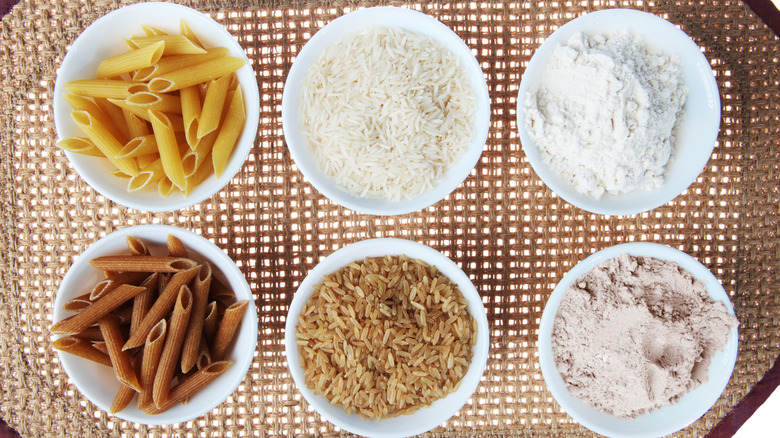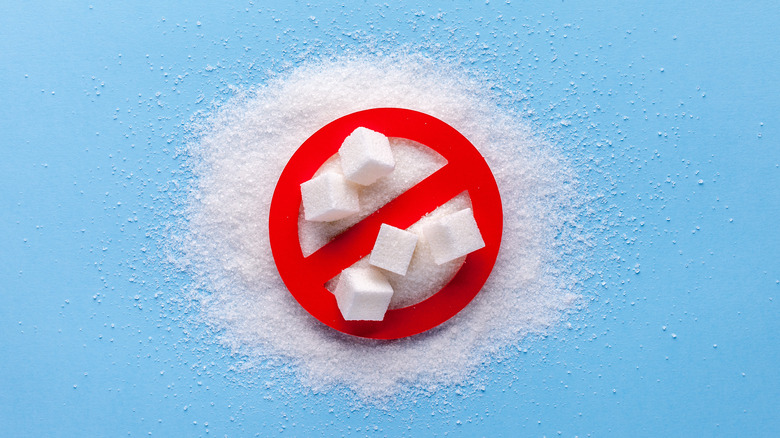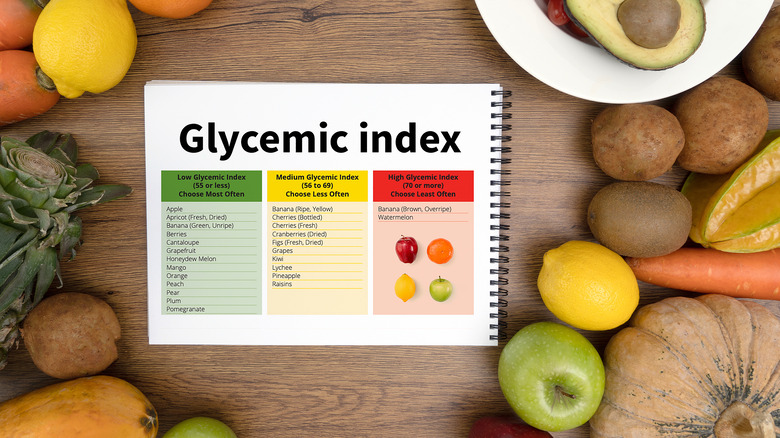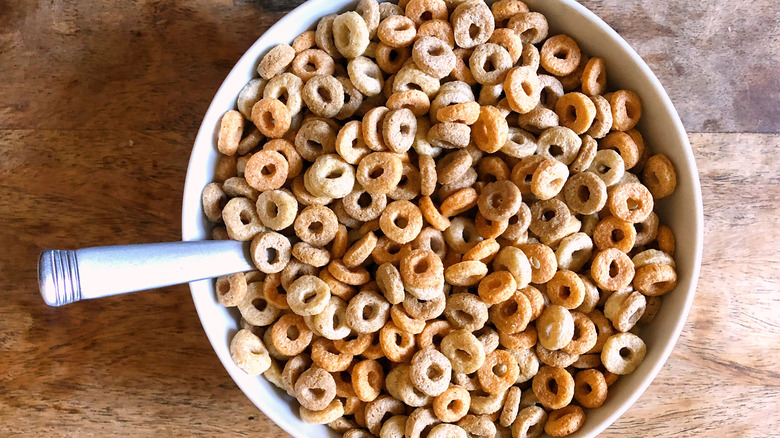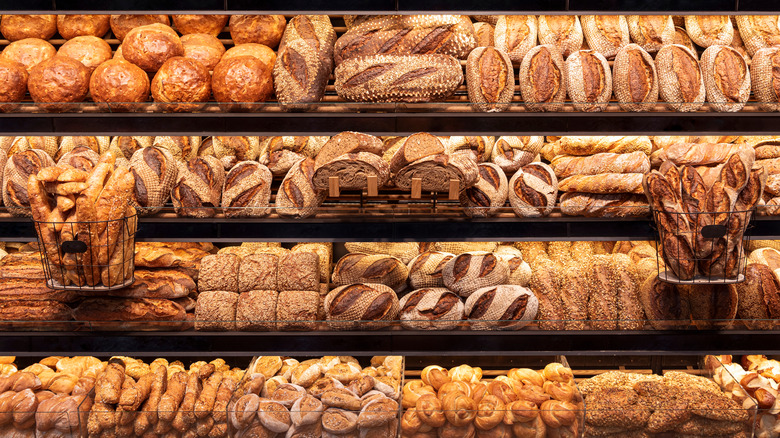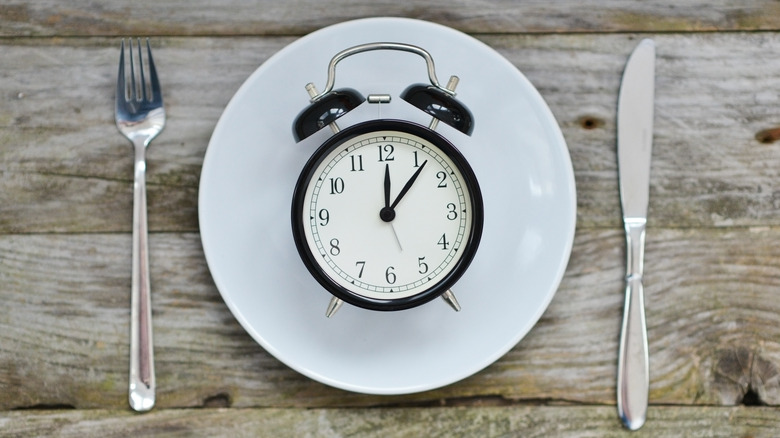Myths About Carbs You Can Stop Believing
There was once a time when fat was the great scourge of the nutrition world, but how times change. These days, it's all about carbs, and the apparently negative effect that eating carbs have on the body has never been more discussed. Throw in the unstoppable growth of the low-carb diet market. The wildly popular low-carb keto diet, in particular, shows no sign of slowing down, with the diet's market size expected to grow to well over $15 billion by 2027, according to Kerry. It feels like there's never been a worse time to be a pasta lover.
But among all the feverish talk about carbohydrates and their impact on health or weight, it's easy to forget that we kinda need them. "Carbohydrates contain essential nutrients that our bodies need to function each day," certified dietitian nutritionist and owner of Goodness Gracious Living Nutrition Beth Rosen told HuffPost. And as with any much-discussed aspect of health or diet — particularly with something that carries such a fear factor as carbs — it's important to separate fact from fiction.
Carbs will make you put on weight
Carbohydrate intake and weight gain are two things that seem to go hand in hand in popular understanding about nutrition. But to put one myth well and truly to bed, eating carbs will not suddenly make you gain weight — no one aspect of a diet can, according to Hayden James, a registered dietitian and diabetes care and education specialist for Intermountain Care in Utah. "Neither carbs nor fats alone cause weight gain," he told Healthline. "It comes down to total calories."
As surgeon and creator of the podcast "Cutting Through Nutrition," Joshua Wolrich corroborates, potential weight gain is fundamentally dictated by how many calories we consume versus how many we expend, and these calories can come from any source (via Healthline). While Wolrich discussed the hypothesis that consuming carbohydrates has an impact on our insulin levels and therefore increases how we store fat, he makes the point that this theory has been combatted in scientific studies. One published in Pathogenesis of Obesity, for example, found that lower-carb diets don't have more of a benefit to body composition or energy expenditure than high-carb ones.
At the end of the day, it largely comes down to how much of anything we eat and, as James said, finding balance in a diet is the most important thing to help you reach any specific goals.
All carbs are the same
Carbs = carbs. And carbs = bad. Right? Well, not quite. Carbohydrates can be placed quite cleanly into two distinct categories: simple carbs and complex carbs (via Everyday Health). Whether they're labeled "simple" or "complex" is largely based on the combination of sugar, starch, and fiber that all carbohydrates are made up of. When a carbohydrate is made up of sugars, which are easy to digest and raise your blood sugar quickly, they're known as simple carbs, and these foods (things like fruit, milk, as well as food that have added refined sugar like soda or candy) are typically what give carbs their perceived negative effects.
Complex carbs, on the other hand, are more... wait for it... complex. As registered dietitian Alicia Galvin states to Everyday Health, "Complex carbs have an additional component — fiber, which is technically a type of carbohydrate, but it's not digested and absorbed." This fiber acts in the carbs favor and provides a wealth of health benefits, not only "[feeding] the good gut bacteria, but it also allows for the absorption of the carbohydrate to be slower into the bloodstream, so it won't spike glucose levels and insulin levels like a simple carbohydrate would," said Galvin. So next time you come face to face with a carb, remember that they won't all have the same effect on your body.
Going carb free forever is your key to dietary success
Low-carb diets have become somewhat synonymous with health, and it's not a huge leap in logic to assume that the fewer carbs we eat, the happier and healthier we'll be. Trying to go without carbs, however, particularly long term, is not only exceedingly difficult to do but will also leave your body wanting nutritional diversity. "Even though they aren't essential for survival, [carbs are] in the majority of foods we eat, including fruits, vegetables, nuts, and seeds," Emmie Satrazemis, registered dietitian, board-certified sports nutritionist, and nutrition director for Trifecta Nutrition, told Well+Good. "So cutting them out completely would mean missing out on so much nutrition."
Aside from the vitamins that you'll miss out on from avoiding carbs entirely, you'll also likely suffer from a lack of fiber, according to registered dietitian nutritionist Wahida Karmally, who works with Columbia University (via Well+Good). This can cause difficulties with digestion and leads to constipation that can be commonplace amongst low-carb diet devotees. While it is technically possible to go ultra-low carb or carb free for extended periods, thinking about how you'll replace these vitamins and nutrients is vital.
All carbs make you tired
The common assumption that eating any carb will end up in you feeling a little sleepy is not entirely what it seems. The slump in energy levels that can be caused by carbs is not the same across the board, and it all depends on the type of carb you eat. Eating simple carbs, which are composed of sugars in larger quantities (like candy, soda, or white bread or rice) can cause a spike in blood sugar, which then rapidly drops, per Livestrong. It's this blood sugar crash that can leave you feeling more tired than you were before.
Complex carbs (carbs composed of higher quantities of fiber and starch), on the other hand, can actually help with maintaining energy levels. As research from the Nevada Journal of Public Health highlighted, complex carbs are digested and release energy way more slowly, which means they don't have the same spiky effect on your blood sugar. As a result, this means that your energy stays much more level. As the researchers discussed, complex carbs can therefore be potentially useful in the management of fatigue, particularly in older adults who experience it more commonly.
You should avoid all sugars
Within the carb world, sugar stands tall as the most controversial component. But should we be avoiding all sources of sugar? While it's certainly true that sugar in and of itself holds little nutritional value, it's important to remember that certain foods that contain sugar are some of the healthiest out there. Many types of fruit, for example, contain higher levels of simple sugar but also come loaded with antioxidants, fiber, and vitamins, as Medical News Today shows. Although the sugar acts in the same way on your body as from any other, less-healthy source, the nutritionally dense nature of fruit means you're also getting a host of positives.
Where sugar becomes particularly problematic, however, is when it's added to other foods, as the Mayo Clinic points out. Added sugars can be snuck into food products in surprisingly high quantities. Not only is this sugar coming with pretty low nutritional value, but it can also increase your risk of heart disease and cause dental issues. Your best bet, then, is to keep an eye on foods that have unnecessary added sugars like baked or packaged goods and to prioritize nutritious options like fruit for a little sweetness.
You shouldn't eat carbs before a workout
How to best eat carbs around exercise is a commonly misunderstood thing. It can be easy to believe that if you avoid carbs before working out, this will ultimately lead you to burn through more fat and therefore lose more weight, should you have a weight-loss goal.
In fact, carbs are pretty vital for a good workout, registered dietitian nutritionist and board-certified sports dietitian Emilie Burgess told Byrdie. "There are two different types of carbs: fast acting and slow acting. Both are essential to an athlete's performance," she explained. And when it comes to what to eat before a workout, much-maligned "quick acting carbs come into play," Burgess continued. "These types of carbs digest and absorb quickly, causing a rise in blood sugar, and make glucose available to the muscles for performance."
According to registered dietitian Jessica Jones, a good choice for a pre-workout snack can be a piece of fruit or toast or a granola bar (per Self). Having a little protein with your pre-workout snack can also help your muscles recover faster after hitting the gym, particularly if you're weight-training.
Aren't all carbs just sugar?
A lot of the myths around carbs come from the assumption that carbs are basically just sugar in pasta or bread form. But there are actually three different types of carbohydrates: starch, fiber, and sugar. And according to the Cleveland Clinic, it's important to understand the difference between them.
Starches, which are complex carbohydrates, deliver vitamins and minerals to the body and can be found in whole grains, beans, pulses, fruits, and vegetables. Starches release energy slowly, as the body takes longer to break them down. Fiber is also a complex carbohydrate and is found in similar food sources. Crucially, your body can't fully break down fiber, and as it moves through your gastrointestinal system it helps to digest food, along with a host of other benefits like helping to lower cholesterol and blood sugar levels and to maintain good bowel health (per Mayo Clinic).
Sugars, the final type of carb, are simple carbohydrates broken down quickly by the body and can come in naturally occurring forms (like in fruit) or added into various types of food. It's this quick breakdown that causes spikes in blood sugar and largely gives carbs their fearsome reputation. While starches are eventually broken down into sugars as well, the fact that they take longer to break down means that you get more nutritional bang for your buck (via Nutritional Doublethink). As Cleveland Clinic recommends, favoring complex carbs higher in nutrients can be a smart choice.
The GI index will tell you, once and for all, which carbs are 'good' and which are 'bad'
Ever heard of the glycemic index? If you have, but you're not entirely sure what it is, we wouldn't blame you. Let us break it down. The glycemic index is essentially a number that can be attributed to different types of food. It tells you how quickly a food can be broken down into glucose, or blood sugar (per WebMD). The traditional thinking behind it is that the higher a number is, the unhealthier a carb is for you. Sounds simple, right?
Well ... not quite. As registered dietitian nutritionist and outpatient dietitian at UM Baltimore Washington Medical Center Amanda Markie pointed out to NBC News, establishing a diet based solely on glycemic index alone doesn't take into practice how we actually eat food. "This index measures the body's response when the carbohydrate is eaten without other foods, but how often are we eating a carbohydrate at a meal on its own?" Markie questions, pointing out that carbs are usually eaten with proteins and fats, which slow digestion. To add to this, a glycemic index doesn't take into account the other nutritional aspects of food. As Markie said, "A soda has a glycemic index of 63, while raisins have a glycemic index of 64, however that does not mean raisins and soda have the same nutritional value."
If it's whole wheat, it's a good carb
In the boxing arena of simple carbs versus complex carbs, complex carbs hold the champion belt in terms of nutritional value and benefits to our health. But something being a complex carb, or being derived from one, doesn't automatically mean that it's going to be healthy. Food items that start as complex carbs can be processed to the point where their nutritional value over simple carbs is not as impressive, such as in the case of a lot of "whole wheat" products, which are branded as healthy but are actually so finely ground that they have a similar effect on blood sugar as refined flour products, according to Healthline.
Another example is brown rice syrup, which on the surface seems as though it will be a healthier alternative to sugar or simple syrup. As Healthline pointed out, though, the glycemic index of brown rice syrup is a whopping 98, meaning it'll get your blood sugar raised fast. The processing that brown rice, normally a nutritious complex carb, undergoes strips it of its nutrients.
What really matters is your net carb amount
When it comes to carbs, it's very easy to get hung up on the amount we're eating. On the surface, calculating your net carb amount feels like a good way to go. "Net carbs" is a term to describe the number of carbs you eat that are actually digestible by your body, calculated by subtracting the amount of fiber present from the rest of the carbs, per WebMD.
While it seems like a good idea, there's no real scientific basis in doing so, and it's a common trick used by food companies."It's a way for the manufacturers of these products to draw attention to them and make them look appealing by saying, 'Look, you can eat all these carbs, but you're really not impacting your health, so to speak,'" registered dietitian Wahida Karmally told WebMD.
More importantly, what net carb calculation doesn't really do is take into account the quality of the carbs you're eating. As registered dietitian and director of Worldwide Nutrition Education and Training at Herbalife Nutrition Susan Bowerman told NBC News, "I have patients who don't drink milk because of the carbohydrate content, but the carbohydrate in milk is not added, it's simply the natural sugar (lactose). But it's hard to tell from a label which carbs are natural and which are added." So don't get hung up on the numbers; focus on good-quality carbs instead.
There's an exact amount of carbs you should be eating
Let's face it, low-carb eating plans love to tell you how many carbs you should — or shouldn't — be eating. Most low-carb diets generally advise you to eat between 20 to 60 grams of carbs per day, according to Mayo Clinic. However, this focus on figures can lead to significant number-crunching in an attempt to nail down the perfect amount.
But the fact is, there's no one-size-fits-all approach when it comes to the number of carbs you should be eating, whether you're following a diet plan or not. As the 2020-2025 Dietary Guidelines for Americans says, a healthy, balanced diet not focused on weight loss calls for 45 to 65% of daily calories to come from carbs — which is a pretty big range to operate in!
What's more, the balance of carbs to other energy sources will vary from person to person, depending on your level of physical activity and any health considerations. In short, there's no perfect amount. What's most important is that your diet is varied, nutritious, and balanced.
You shouldn't eat carbs after a certain time
At 6 p.m., you should immediately stop eating bread or pasta, right? No, that is a myth that's as old as time. One of the ideas behind doing so is fairly simple, according to Livestrong, which explains that avoiding carbs after a certain time can help limit your overall amount of calories, as well as raise consciousness about absent-minded eating.
However, the idea that there's a best and worst time to eat carbs for your body to digest it, or for potential weight loss, is largely false. Unless you're eating them around exercise to improve performance or recovery, as Healthline explained, there's isn't really an optimal time to consume carbs — particularly when it comes to weight loss goals. The more important thing is to try as much as possible to emphasize the consumption of nutritionally sound complex carbs and watch your overall calorie intake.
Eating meat without carbs is the healthier choice
A burger without the bun? A burrito without the wrap? On the surface, these seem like healthier options. After all, you get to enjoy the delicious meat without the additional calories or carbs. It's a win-win, no?
Hold that thought, because in that equation is still one not-so-amazing component: a ton of red meat. "It is wrong to think that we can always eat red meat" as a replacement for the carbs we're removing from our diet, Antonia Califano, author of "Anti-Diet" and co-founder of Styleoga, told Eat This, Not That. While the keto diet throws up images of plate upon plate of beef or pork while still losing weight, Califano points out that "studies from the World Health Organization show that a varied diet is required, where red meat is not consumed more than twice a week."
High consumption of red meat over time can lead to a bevy of health concerns, like a higher risk of heart disease, cancer, and diabetes, per Harvard Health Publishing. Additionally, plant-based sources of protein that come from foods that also contain carbs are not only generally lower in calories than their meaty counterparts (which is ultimately the thing you want to keep an eye on if weight loss is your goal), but increase levels of satiety more than meat, as a study published in Food and Nutrition Research showed.
Carbs with gluten are especially bad for you
You thought carbs were controversial? Let us introduce you to our friend gluten. Gluten, the protein found in wheat, spelt, and rye, has come under scrutiny in recent years as increasing options for gluten-free products have become available. This has led to an assumption that gluten is necessarily bad for you, and that carbs without gluten are healthier.
If you don't have a gluten intolerance or allergy, however, it's unlikely that carbs containing gluten will have any distinct difference on your body than those that don't. Daniel A. Leffler, director of clinical research at Beth Israel Deaconess Medical Center's Celiac Center, put it pretty bluntly to Harvard Health Publishing, saying, "People who are sensitive to gluten may feel better, but a larger portion will derive no significant benefit from the practice. They'll simply waste their money, because these products are expensive."
Furthermore, by going gluten free when you don't have a clear medical reason to do so, you can miss out on vital nutrients that are present in whole wheat products. "The average American diet is deficient in fiber," said Leffler. "Take away whole wheat and the problem gets worse."



